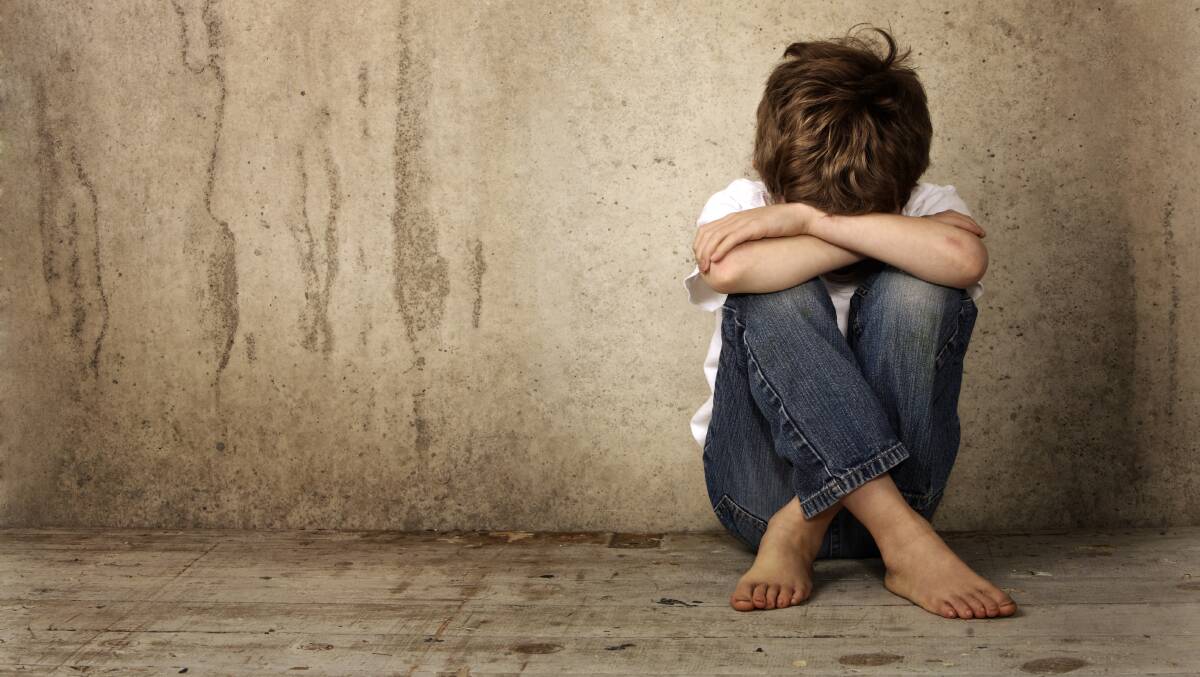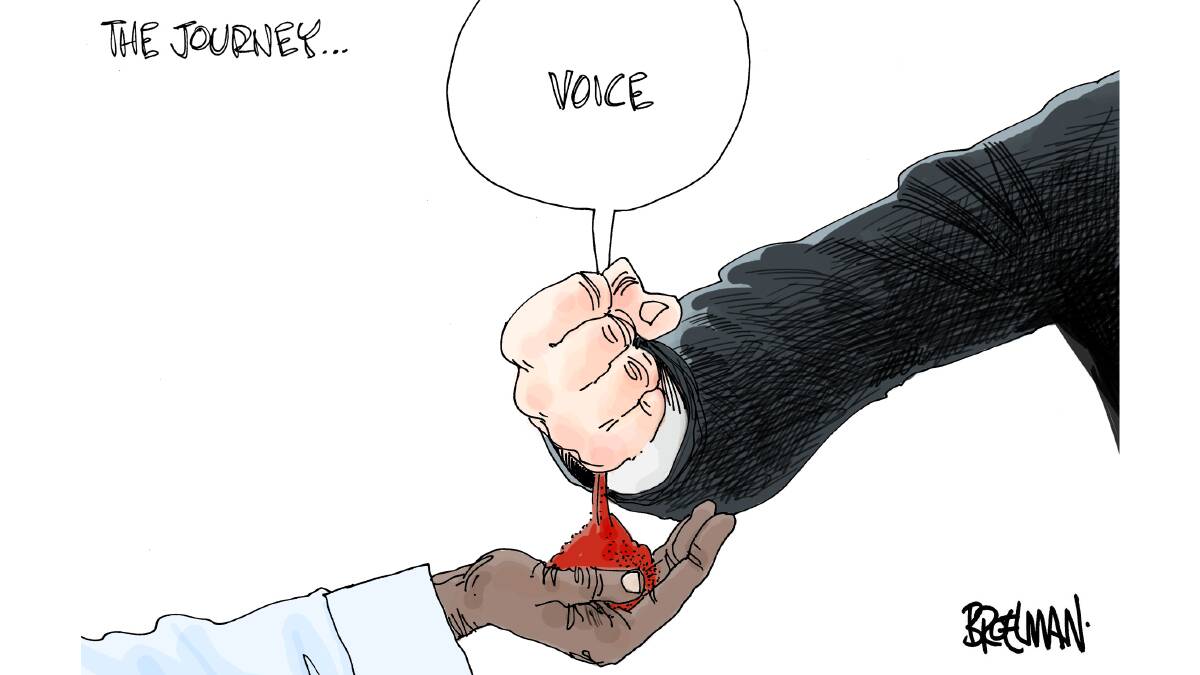This is a sample of The Echidna newsletter sent out each weekday morning. To sign up for FREE, go to theechidna.com.au
Subscribe now for unlimited access.
$0/
(min cost $0)
or signup to continue reading

The nightmares of children are often filled with imaginary monsters. But my father was haunted by a real one and one morning in early September 1963 it knocked several times on our front door.
My mother was home from hospital a few days after giving birth to me when Dad opened the door. A Catholic priest stood on the porch staring at him with a cold, knowing smile.
Dad turned to Mum, his face ashen, his voice pleading. "Take the baby and go to the back of the house and please don't come out until I tell you," he said.
My father gripped the door handle and spoke quietly to the priest for several minutes. But he never invited him inside.
It took another 40 years to learn why.
***
His Eminence Cardinal George Pell sighed impatiently over the phone. He sounded weary, like a man who had heard it all before and wanted to dispense with the dull preliminaries and get down to business.
"How much?" he asked.
How much? This was about more than money. I'd written to Pell asking him to help break an impasse between the church and my father. To his credit he'd called back promptly. I wondered if he did that for everyone, or if it had more to do with me being editor at the time of one of the biggest selling newspapers in the country, the Daily Telegraph.
A few years earlier Dad had surrendered the secret he'd kept to himself for so long. My father had grown up in a Christian Brothers orphanage and its superintendent, Brother Aloysius Francis Webster, had taken a shine to a skinny, vulnerable kid who had never known a father of his own. But the gifts Webster bestowed on Dad soon led to years of molestation and assaults no pubescent kid should experience.
Shame and guilt, the lifelong shadows of abused children, accompanied my father long into adulthood. Webster's unannounced visit to our home that morning in 1963 - Dad had instinctively not wanted him anywhere near me - was not just to offer congratulations on starting a family. The monster was making sure Dad continued keeping his mouth shut.
Decades later, when my father could no longer keep the horrors to himself and was ready to seek justice, Brother Webster lay rotting below the ground. But his evil continued to fester above it.
Dad joined the thousands seeking reparations from an organisation that knowingly allowed predatory priests like Webster to prey on children for decades. The church acknowledged my father's abuse. Webster had form. But compensation was another matter. The case became mired in technical legal matters.
Catholic Inc, with its $30 billion property portfolio, endless revenue streams and tax-free status, rarely surrendered a dollar it believed was better off banked.
My father eventually settled with the church soon after my "how much?" conversation with Pell. The settlement - far less than Dad deserved - was better than watching him mauled in court by a ravenous pack of church lawyers employing semantics to defend the indefensible.
Since then I've watched our country grow far too complacent about the criminal outrages, cover-ups and moral decrepitude of our churches. Even explosive claims by independent MP Andrew Wilkie in Parliament this month that Hillsong had engaged in money laundering, tax evasion and extravagant use of church donations were met largely with indifference. As if we expected nothing else these days.
We damn well should. At the very least religious organisations should have been stripped of their absurd tax-exempt charity status after the findings of the royal commission into child abuse. The spineless timidity of Labor and the Liberals, with their historical religious ties and unwillingness to incur the wrath of church followers, ensured that would never happen.
But there is another way to force greater transparency on religious organisations. Revise the Charities Act, which currently exempts from taxation any institution engaged in the business of "advancing religion".
Unlike other registered charities that must legally demonstrate the public benefit of their work, religious organisations - from the giants through to Hillsong and Scientology - are permitted to keep private their complex corporate structures and profit and loss ledgers.
A simple revision to the act would remove that automatic exemption. To qualify for ongoing tax-free status, religions would be forced to open their books and demonstrate the public benefits they so often remind us they provide.
Surely not such a big ask for institutions that swear they have nothing to cover up these days. Unless they have other monsters they want to keep hidden.
HAVE YOUR SAY: Should religious organisations pay tax? If not, why not? Does Australia have too many registered charities? And have you or someone you know suffered from institutional abuse? Email us: echidna@theechidna.com.au

SHARE THE LOVE: If you enjoy The Echidna, forward it to a friend so they can sign up, too.
IN CASE YOU MISSED IT:
- Ten Australian Defence Force soldiers swam for their lives after the helicopter they were on ditched into water near Jervis Bay during a night-time counter-terrorism training exercise. Defence has grounded its fleet of Taipans, which have previously had safety concerns raised about "major risks and issues", and launched a safety investigation.
- Police prevented independent senator Lidia Thorpe from approaching British anti-transgender activist Kellie-Jay Keen-Minshull on the lawns before Parliament Hous. Senator Thorpe fell to the ground as police barred her from approaching the anti-trans group's rally.
- An emotional Prime Minister Anthony Albanese has revealed the proposed wording of the question that will be put to Australians to enshrine an Indigenous Voice to Parliament. The proposed words have been revealed as: "A proposed law: to alter the Constitution to recognise the First Peoples of Australia by establishing an Aboriginal and Torres Strait Islander Voice. Do you approve this proposed alteration?"
THEY SAID IT: "You know what they ought to do with churches? Tax them. If holy people are so interested in politics, government, and public policy, let them pay the price of admission like everybody else." - George Carlin
YOU SAID IT: Angry Mark Latham and measured Gareth Evans, two very different people cut from the same Labor cloth.
"Somewhat grumpy" Brent says: "Do you, and readers, give heed to the actual numbers of LGBTQI people in the community in relation to the amount of noise they're making? Talk about a little dog's tail. Mr Google provides the details: In 2011, same-sex couples accounted for 0.7 per cent of the total number of couples. It increased to 0.9 per cent in the 2016 Census. In 2016, there were 23,700 male same-sex couples and 23,000 female same-sex couples. According to percentages averaged across the three survey datasets, 3.6 per cent of males and 3.4 per cent of females described themselves with a minority sexual identity. When applied to Estimated Resident Populations, this gives a sexual minority population at ages 18+ in Australia of 599,500 in 2011 and 651,800 in 2016. Hopes this helps to provide realistic perspectives."
Lee points to differences between Gareth Evans and Paul Keating: "I would not put Evans in the same league as Keating. Evans may be commenting now but has been quietly doing his thing. Keating, however, hasn't stepped out of the limelight since leaving his post in the Labor caucus. As for Latham, I believe he is a man who thrives on the spotlight, this is why he continues to shout and stamp. It gives him what he wants - people's attention. He has been sneaky at resigning to recontest another tilt at the upper house. Forgive me for being sceptical, but is he just looking for a nice pollie pension?"
Arthur says: "Gareth Evans is correct in sounding warnings about being too close to the US. The submarine deal is now done and it is too late to change without making Australia a laughing stock on the world stage."
Julie sounds jaded: "Funny about Bob Carr being outspoken on AUKUS as he was the foreign minister in the Gillard government that allowed US marines to be based in Australia. If you ask me all of them are past their use by date along with all the current Labor cabinet members."
As well as correcting for its egregious error (Latin has never been a strong suit) Erik makes another point: "Singular: alumnus. Plural: Alumni. Not acceptable: alumnis. As for AUKUS, a horrible deal which we need to revoke. Keating's content was absolutely spot on, though his delivery was appalling, even for him."
Old Donald confesses: "I am ashamed to my pathetic backbone to admit that I in effect voted for Latham in 2004. It was a case of anything to remove Little Johnny. At least it taught me that no matter what my political views, a poor choice of party leader remains a poor choice for everyone."
Chris says: "Never had time for Latham in any capacity. I saw him on Sky last night presenting himself as some kind of right wing crusader ready to save NSW from the 'left' doomsday. Cheers to Keating, Evans et al for doing serious leadership work in investigating the issues surrounding AUKUS. One wonders what the current leadership did? It is the perspective provided that is valuable. Perhaps there needs to be a 'voice' to the ALP offering such alternative perspectives before it goes off gung ho."


